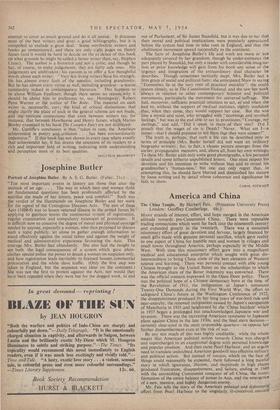Josephine Butler
Portrait of Josephine Butler. By A. S. G. Butler. (Faber. 21s.) "THE most important events in history arc those that alter the outlook of an age. . . . The way in which men and women think on fundamental questions has been profoundly affected by the sacrifice she made of her leisure, peace and comfort." Such was the verdict of the Hammonds on Josephine Butler and her work for the repeal of the Contagious Diseases Acts. The aim of these Acts (1864-9) was to lessen venereal disease in the armed forces by applying to garrison towns the continental system of registration, regular examination and compulsory treatment of prostitutes. It is difficult now to conceive the degree of moral and physical courage needed by anyone, especially a woman, who then proposed to discuss such a topic publicly, let alone to gather enough information to stand effectively against the social taboo and against the weight of medical and administrative experience favouring the Acts. This courage Mrs. Butler had abundantly. She also had the insight to see both the legal consequences of a system which gave plain- clothes special police the power to detain a woman on suspicion only, and how registration leads inevitably to licensed houses, commercial procuration and the white slave traffic. (Only the first step was taken in England, but the sequence was clear on the continent.) She was not the first to protest against the Acts, nor would they have been repealed when they were but for the dogged work, in and
out of Parliament, of Sir James Stansfeld, but it was due to her that their moral and political implications were popularly appreciated before the system had time to take root in England, and that the abolitionist movement spread successfully to the continent.
The facts of Josephine Butler's life and work are more or less adequately covered by her grandson, though he under-estimates the part played by Stansfeld, but only a reader with considerable imagina- tion or prior knowledge will gain from his book any sense of the urgency and integration of the extraordinary dual character he describes. Though sometimes tactically inept, Mrs. Butler had a firm grasp of social and political facts; she anticipated Shaw in saying "Economics lie at the very root of practical morality"; she could reason closely, as in The Constitution Violated, and she saw her work always in relation to other contemporary feminist and political movements, particularly the movement for universal suffrage. She had, moreover, sufficient practical intuition to act, as and when she had to, without the support of medical statistics, rightly confident that, when they came, they would support her case. But she was also a mystic and saint, who struggled with " "doubtings and revolted feelings," but was in the end able to say to prostitutes, "Courage, my darlings," and add, "Did I speak to them ..of their sins? D:d preach that the wages of sin is Death? 'Never. What am I—a sinner—that I should presume to tell them that they were sinners?"
The truth is, perhaps, that such a life can be described only in terms of principle (Mrs. Butler herself did not want an ordinary biography written); for, in fact, a clearer picture emerges from the earlier, propagandist memoirs, and, above all, from her own writings. To these Mr. Butler adds only some good photographs, a few personal details and some hitherto unpublished letters. One must respect his devotion and his intention to write without bias and to reveal his grandmother's human-ness,' but one can only regret that, in .attempting this, he should have blurred and diminished her stature by loose writing and by detail whose coherence and significance he fails to show.
CAROL STEWART










































 Previous page
Previous page